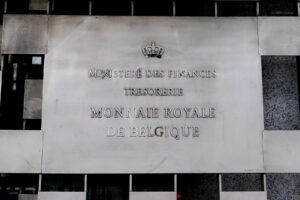This guide explains how the corporate tax system in Belgium works, including advice on the following:
- The corporate tax system in Belgium
- Who pays corporate tax in Belgium?
- Corporate tax rates in Belgium
- Corporate tax exemptions and credits in Belgium
- VAT in Belgium
- The corporate tax year in Belgium
- How to file your corporate tax return in Belgium
- Other types of business tax in Belgium
- Corporate tax fines in Belgium
- Corporate tax advice in Belgium
- Useful resources
MeDirect
Get more from your money with MeDirect. This Belgian savings and investment bank is home to financial experts who can help you expand your investment portfolio and track your stocks and shares. Enjoy in-app accessibility and let your money work for you with MeDirect.
The corporate tax system in Belgium
If you own a company in Belgium, you may need to pay corporate tax. The corporate tax rate you’ll need to pay depends on the type of business you own and the size of your profits.
Companies must file their corporate tax return on an annual basis and make quarterly payments. When filing their tax returns, companies can deduct a range of expenses before calculating their overall profit.
Who pays corporate tax in Belgium?
Corporate tax applies to companies, associations, bodies, and establishments that have their registered office in Belgium.
Do sole traders and partnerships need to pay corporate tax?
Freelancers, sole traders, and those with a stake in a partnership generally pay income tax (impôt des personnes physiques in French, personenbelasting in Dutch) on their profits, rather than the corporate tax.

Freelancers working in Belgium for more than six months (183 days) of the year are Belgian residents for tax purposes. As a result, they must pay tax on their worldwide income.
Taxable income is the profit remaining after deductions for social security contributions and other allowable expenses.
In 2024 (for 2023 income), residents have a tax-free allowance of €10,160 (higher for people with children). Income tax bands range from 25% to 50%.
Income tax is payable one year after the end of the tax year. Workers can spread the cost by paying advance estimated payments on a quarterly basis.
Corporate tax rates in Belgium
The Belgian corporate tax rate remains at 25% for 2024.
A lower rate is applicable for companies that are more than 50% owned by individuals or have smaller profits.
Companies must pay a surcharge of 6.75% on their final corporate tax bill after it has been assessed by the authorities. Companies can avoid this charge by making sufficient tax payments in advance.
Corporate tax exemptions and credits in Belgium
Companies with profits of less than €100,000 can benefit from a lower corporate tax rate of 20%.
To qualify for this reduced rate, a number of conditions must first be met. These include the company meeting the rules for small- or medium-sized enterprises and adhering to regulations around salaries paid to the managers and directors.
Corporate tax credits
Some tax credits are available to companies, such as those for patents and research and development (R&D).

For example, companies who spend money on R&D and patents can either receive an immediate tax credit or reduce their taxes over several years.
Deductible expenses for companies
- Depreciation of assets: tax can be deducted at the following rates for depreciation of company assets: commercial buildings (3%), industrial buildings (5%), machinery and equipment (20% or 33%), and rolling stock (20%). To find out even more about how these rules apply to your company, take advice from a tax expert.
- Start-up expenses: incorporation costs can be fully deducted in the year of incorporation or depreciated over a period of up to five years.
- Charitable contributions: charitable contributions are deductible as long as they don’t exceed 5% of the total net income of the company.
- Vehicles: the deductibility rate for automobiles depends on their CO2 emissions and when the company bought the vehicle.
- Operating losses, interest expenses, and bad debt reserves: the degree to which you can offset these against your bill varies depending on a variety of factors. Seek advice from a tax expert on the specific options available to your company.
VAT in Belgium
VAT is Taxe sur la Valeur Ajoutée (TVA) in French or Belasting over de Toegevoegde Waarde (BTW) in Dutch.

If your business is offering goods or services (with some exceptions, such as teachers, journalists, artists, doctors, and lawyers), you may be liable to pay VAT – and charge your clients VAT, too. It is important that you keep accounts (an invoice book) and receipts.
The VAT rate in Belgium is 21%. VAT must be paid monthly or quarterly, and companies can reclaim the VAT on their professional expenses.
There is also a VAT threshold in Belgium: small businesses can claim an exceptional VAT threshold if their turnover is under €25,000. In this case, you can apply for small enterprise status (Dutch: kleine onderneming status, French: petite entreprise), which makes you exempt from VAT but also from claiming it back.
Cross-border VAT in Belgium
If you’re selling goods to another VAT-registered business elsewhere in the European Union, the customer pays VAT at their own country’s rate.
This also works the other way around. If you buy goods from another country within the EU, you’ll pay VAT at Belgian rates.
When making a cross-border transaction, you will need the customer’s VAT number. You can check this through the European Commission.
The corporate tax year in Belgium
The Belgian tax year runs from 1 January to 31 December. Taxpayers must submit tax returns annually.
Before filing a tax return, companies must register with the tax office and, if necessary, the VAT office. Both can be done through a one-stop shop or business counter (guichet d’entreprise in French, ondernemingsloket in Dutch).
If you are a non-resident with a Belgian-earned income, you have to inform your competent tax collector’s office, who will send you a tax return each year. You can also pay by mail or online.
How to file your corporate tax return in Belgium
The filing deadline for 2023 corporate tax returns is seven months after the end of the company’s financial year. Assuming the financial year runs in line with the calendar year, the deadline would be 31 July 2024. Companies in Belgium no longer receive a paper tax form. They instead need to file their return electronically via the government’s Biztax application.

Companies generally make their Belgian corporate tax payments in four instalments:
- First quarter: no later than 10 April
- Second quarter: no later than 10 July
- Third quarter: no later than 10 October
- Fourth quarter: no later than 20 December
Other types of business tax in Belgium
Capital gains on shares
For 2024, capital gains on qualifying shares realized when meeting all conditions are fully exempt from tax. Non-qualifying shares are subject to the standard 25% corporate tax rate.
Minimum tax base
Companies with profits of more than €1 million face limits on how much they can deduct from their corporate tax bills.
Some deductions (such as tax losses carried forward) are only deductible up to 70% on the taxable profit that exceeds €1 million.
Corporate tax fines in Belgium
The government can calculate the company’s tax bill automatically in the event of a late return.
How much companies are charged is estimated based on factors including turnover and number of employees, and varies by industry sector.
Companies who file late must pay a surcharge. The surcharge depends on the company’s previous filing record and its’ (deemed) intention to avoid taxation. If you fail to properly report some of your profits, you could face an increase of up to 200% of the taxes due on that income.
The government can also apply fines or legal sanctions to companies who fail to pay corporate tax.
Corporate tax advice in Belgium
You can find an accountant (expert-comptable in French, accountant or belastingconsulent in Dutch) through the website of the Instituut van de Accountants en de Belastingconsulenten.
Useful resources
- Federal Public Service Economy SMEs, Self-Employed, and Energy – information on self-employment in Belgium
- Belgium.be – information on Belgian social security
- RSVZ – social security authority for self-employment in Belgium
- FPS Finance – more information on VAT (in Dutch, French, and German)





